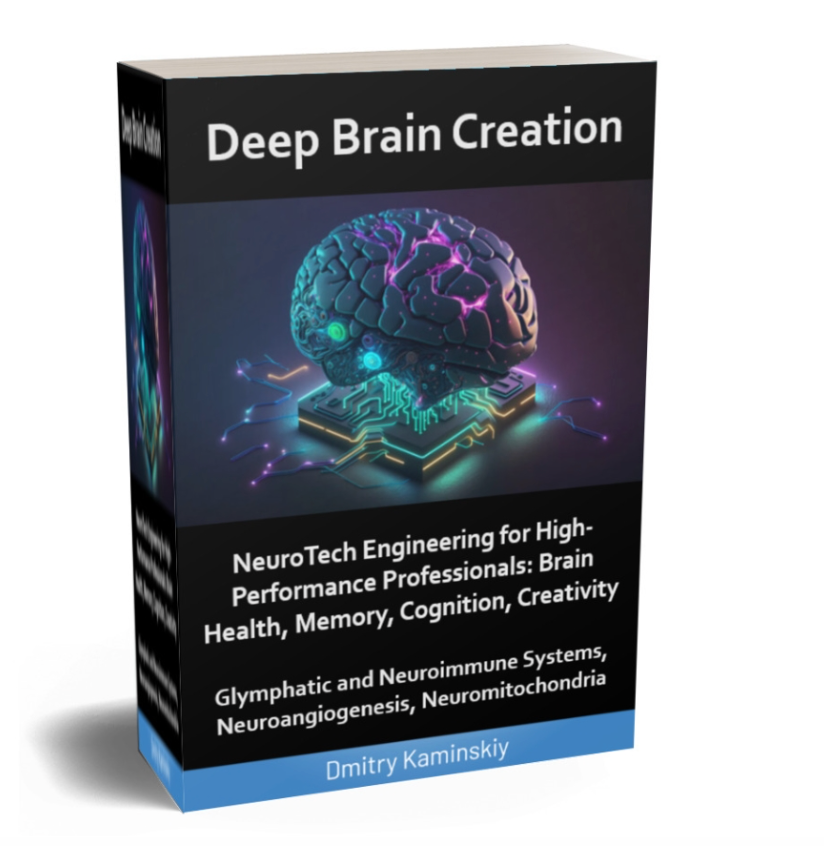AI and Neurotech: The Brain's Future Performance Partner
- Deep Brain Creation
- Sep 18
- 4 min read
In my book Deep Brain Creation: Neurotech Engineering for High-Performance Professionals, I discuss how we're transitioning into an era of cognitive optimization. As industries become increasingly data-driven, professionals in every field must adapt to new ways of optimizing their mental faculties for peak performance. The intersection of neurotechnology and artificial intelligence (AI) is making this optimization a reality, offering tools that enhance everything from focus to memory, creativity to decision-making. But how do AI and neurotech combine to fuel cognitive optimization in real-time? Let's dive into that.

The Cognitive Revolution
Traditionally, performance enhancement was a matter of cultivating personal habits: managing stress, exercising, improving sleep, and adopting better time-management strategies. However, as the complexity of professional life increases, so too must our methods for supporting cognitive function. This is where neurotechnology and AI step in. These innovations enable professionals not only to maintain but enhance their mental agility, resilience, and overall performance.
Imagine being able to monitor your brain's activity in real time, receiving feedback that helps you focus during critical moments or manage stress before it becomes overwhelming. Technologies like neurofeedback and electromagnetic stimulation are already available, and as AI integrates with these platforms, they’re set to become more intuitive and personalized.
Neurofeedback: The Brain's Digital Mentor
Neurofeedback is one of the most mature tools in neuroenhancement, used for everything from managing ADHD to boosting cognitive performance in high-stakes environments. At its core, neurofeedback helps individuals train their brains to achieve desired states of function—be it relaxation, focus, or heightened alertness. This is done by providing real-time feedback on brainwave activity, enabling the brain to adjust itself without external intervention.
For high-performance professionals, neurofeedback can be the key to managing cognitive overload and maintaining sharpness. Elite athletes, traders, and creatives are already using this technology to optimize their mental states. However, the true breakthrough comes when AI-enhanced neurofeedback systems are introduced. These platforms can now learn an individual's baseline cognitive patterns, adjust feedback based on performance history, and even predict cognitive "drift" before it happens.
This integration of AI into neurofeedback systems isn’t just about responding to immediate brainwave changes—it's about creating an environment of digital neuromentorship. Imagine a world where your brain is continuously guided toward its most productive states, much like an athlete training for peak performance.
Electromagnetic Stimulation: Modulating Brain Activity
While neurofeedback trains the brain to regulate itself, electromagnetic stimulation techniques like Transcranial Magnetic Stimulation (TMS) actively modulate brain activity. TMS has long been used in clinical settings for treating depression and anxiety. However, its potential extends far beyond that. TMS can stimulate or inhibit specific brain regions to boost focus, enhance working memory, and even improve creativity.
The advantages of TMS go beyond traditional cognitive enhancement. By using electromagnetic fields, it actively modulates the brain's oscillations, optimizing its electrical activity in a targeted, non-invasive manner. This kind of precision is critical for high-performing professionals who need to maintain consistent focus and high cognitive output over long periods.
TMS is particularly useful in the context of stress resilience—a growing concern in today’s fast-paced, high-pressure work environments. When used in conjunction with AI-driven systems that monitor an individual's cognitive load, TMS can provide dynamic adjustments to brain stimulation, ensuring professionals remain at their peak without crossing the threshold into burnout.
How AI Personalizes NeuroTech for Optimal Performance
The real value of neurotechnology lies not only in the devices themselves but in how they can be personalized for each individual’s unique cognitive profile. Enter AI: the game-changer that takes neurotech beyond basic enhancement.
AI systems can create dynamic cognitive models for individuals, assessing everything from sleep patterns to emotional regulation. These systems continuously adapt based on incoming data, ensuring that interventions—whether through neurofeedback or electromagnetic stimulation—are precisely calibrated for maximum efficacy. By learning from each user's cognitive performance over time, AI can also predict potential cognitive issues, such as fatigue or stress, before they impact performance.
For example, AI-enhanced neurofeedback systems could recommend tailored cognitive exercises based on your current brain state, guiding you through personalized sessions to enhance focus or creativity. Similarly, AI-enabled TMS devices could adjust stimulation parameters in real time to optimize memory retention during a crucial meeting or presentation.

The Path Forward: Seamless Integration of AI and Neurotech
At Deep Knowledge Group, we have long advocated for the integration of neurotechnology, AI, and biotechnology. This convergence is critical for achieving cognitive longevity—the ability to sustain optimal cognitive performance throughout life. AI doesn’t just act as an enhancement tool; it acts as a companion to neurotech, ensuring that these interventions are not only more effective but also more adaptive.
Looking ahead, the combination of neurofeedback and AI promises an exciting future. As AI models continue to evolve, they will integrate even more deeply into neurotechnological platforms, enhancing the customization and precision of cognitive interventions. This could be the key to scaling cognitive longevity across populations, allowing us to enhance mental performance in ways we’ve never before imagined.
The New Frontier of Cognitive Optimization
The age of passive cognitive health is over. With neurotechnology and AI, we are entering a new era where individuals—especially high-performance professionals—can actively optimize their cognitive performance. Technologies like neurofeedback and electromagnetic stimulation, powered by AI, represent the cutting edge of cognitive enhancement, enabling professionals to manage stress, increase focus, and extend their cognitive lifespans.
For those looking to explore this transformative field, my book Deep Brain Creation outlines the frameworks, tools, and strategies necessary for taking control of your cognitive future. By understanding the science behind these technologies and their potential, you can begin to leverage them for better mental performance, greater creativity, and long-term professional success.
Stay tuned for more articles in this series, where we’ll explore specific use cases, technological advancements, and actionable strategies for integrating neurotech into your daily life.



Comments